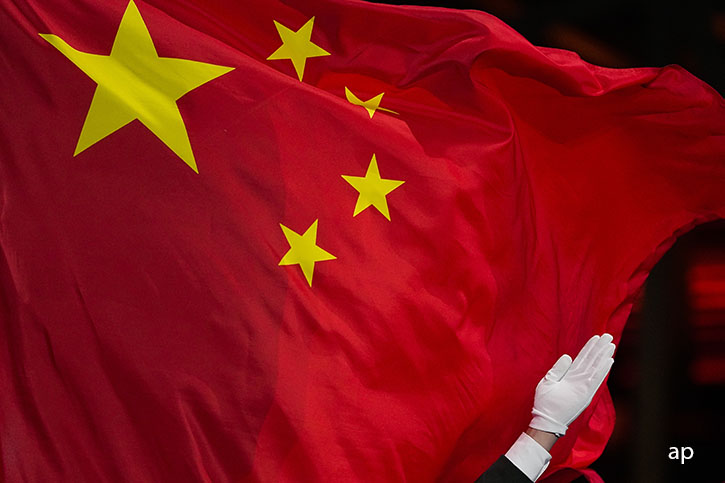The Chinese Communist Party authorities monitor the phones of ethnic Uighur people, a minority, mostly Muslim Turkic-speaking group in the Xinjiang Province to flag content deemed as extremist by the state authorities, revealed a recent report by the Human Rights Watch. According to the 50,000 multimedia files that serve as a guide to flag content as promoting extremism, even the possession of the Quran can lead to a police investigation against the person. This list that the CCP government uses includes not only “violent and terrorist” content like video, images, and audio produced by terror groups like ISIL, but also any content from organizations demanding self-determination and identity of the minority Muslim Uighur group in Xinjiang province. The organizations which come up in this “extremism” list include the separatist “East Turkestan independence movement, the World Uyghur Congress exile group, and the United States government-funded news outlet Radio Free Asia”, according to Al Jazeera. According to the metadata analysis by Human Rights Watch, this list targets content regarding the Tiananmen Square Massacre, readings from the Quran, religious songs, as well as well as a travel show filmed in Syria, titled, “On the Road”.
The list analyzed by Human Rights Watch is a part of 52 GB of documents sourced from a Xinjian police database which was leaked to Intercept, which is a US-based media outlet in 2019, according to Al Jazeera. This list is yet another evidence of the Chinese government’s attempt to restrict any religious persecution in the Xinjiang region, which some separatist groups also call East Turkestan. According to the report by Human Rights Watch, residents of the Xinjiang province are mandated to download an app called Jingwang Weishi by the Chinese police, which allows authorities to monitor people’s phones’ contents. HRW analyzed 1000 files from the 11.2 million searches done by Chinese police on more than 1 million citizens’ phones and found that 57% of all content flagged as extremist was ordinary religious material. This recent revelation by Human Rights Watch has reaffirmed to the international community the extent of religious persecution experienced by Muslim minorities in China, and the urgent need to investigate the violent crackdown of the government against minority groups in the far-western province of Xinjiang.
It is important to note that the crackdown on the Uighur people’s civil liberties in Xinjiang is not recent news. Reports of Muslim residents of Xinjiang being detained at “re-education” camps have been in the news since 2017. According to the Council for Foreign Relations, the Chinese government started reeducation efforts in the western province as early as 2014 and ramped up the construction of internment camps for residents in 2017. According to Reuters journalists, the size of 39 such camps in the province tripled in size between April 2017 and August 2018 according to satellite imagery. Uighur (Muslim) residents of Xinjiang province were detained in these camps for any reason such as “traveling to or contacting people from any of the twenty-six countries China considers sensitive, such as Turkey and Afghanistan; attending services at mosques; having more than three children; and sending texts containing Quranic verses”, according to CFR. The recent HRW report on the flagging of residents’ phones for “objectionable” content confirms the fact that the Chinese authorities are targeting Muslims simply for practicing their religion.
Coming back to the recent report on the tagging of Uighurs as extremists according to a list, Human Rights Watch has urged the UN to carry out an “independent, international investigation into rights violation and the suppression of fundamental freedoms in Xinjiang by China against Uighurs and other Turkic Muslims”, reported WION News. In addition, Maya Wang, who is the acting China director at HRW said that the mere possession of the Quran on their phones could trigger a police investigation owing to the surveillance technology being used by the Chinese state in Xinjiang, according to Al Jazeera. In the past as well, Human Rights Watch, the New York-based international NGO has voiced concern over China’s inhumane treatment of Turkic minorities and urged the international community to take strong actions against the torture and detainment of Uighurs in internment camps in the province. Their recent report elaborates on Chinese law by claiming, “China’s counterterrorism law defines “terrorism” and “extremism” in an overly broad and vague manner that facilitates prosecutions, deprivation of liberty, and other restrictions for acts that do not intend to cause death or serious physical harm for political, religious, or ideological aims”. This details the fundamental difficulty in holding China accountable for its actions against minorities within its territories.
Although China has been facing rising international criticism and protests regarding its crackdown against Uighurs, the CCP authorities have denied any allegations of mistreatment, claiming that the US and the West are peddling an anti-China narrative, while also resorting to harassing activists, and preventing the UNHCR from releasing a report on this issue, according to the CFR. The EU imposed sanctions against Chinese officials in 2021, while many countries including the UN have accused China of committing genocide against the Uighurs in Xinjiang. According to the CFR report, the US and the UK have banned and imposed restrictions on importing any goods related to Uighur forced labor from Xinjiang province. Overall, the international community has been pressurizing the CCP administrations for many years, but to no avail. Many countries have been reticent to condemn China’s abuses, even some of its Muslim partners like Pakistan owing to their economic ties and reliance on China. The report by Human Rights Watch has removed any doubt that Chinese authorities are targeting anyone who merely attempts to practice their religion and is a serious issue that the international community needs to stand up against and confront China into changing its attitudes toward their minorities.

